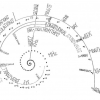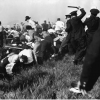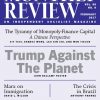
Marx and Engels and the ‘Red Chemist’
Most accounts of Marx and Engels’s lives, if they mention Carl Schorlemmer (1834–92) at all, refer to the renowned chemist only as a friend, without acknowledging his influence on their studies of the natural sciences. It is time to restore this neglected figure to his rightful place in the Marxian—and Engelsian—tradition. | more…

The Return of Engels
For decades, academics have suggested that Engels downgraded and distorted Marx’s thought. Today we are at last seeing the return of Engels, whose work continues to inform the struggles and inspire the hopes that define our own time. | more…

Astronauts at Work
As astronauts penetrate ever further into the cosmos, how are their bodies and subjectivities being transformed? While space travel remains governed by mechanisms of power and domination that tend to treat astronauts as tools, the practice of “space medicine” is now beginning to interact with astronauts’ bodies in a more multidirectional, dialectical fashion. | more…

Steelworkers in Struggle
Ahmed White’s vivid and deeply researched account of the Little Steel strike of 1937 makes an important contribution to our understanding of U.S. labor history, union organizing, and class conflict. It illustrates the tactical complexity of strikes, reveals the power and ruthlessness of employers, and demonstrates the risks of relying on the state to secure justice for working people. | more…

February 2017 (Volume 68, Number 9)
For those attuned to the most fashionable trends in mainstream discourse on climate change, it is clear that “resilience” is now in, and “sustainability” is out.… The concept of resilience, while adopted by some progressive thinkers and organizations, is nonetheless being rapidly incorporated into a survival-of-the-most-resilient philosophy in which poor nations, and indeed exploited and dispossessed people everywhere, are told they must simply become more “resilient” in order to survive—but in a world in which such dynamic adaptability is available mainly to the rich, who enjoy monopolies of capital, resources, and technology. | more…

Trump and Climate Catastrophe
It would be wrong…to see the new administration as simply a cabal of ignoramuses, beginning with the climate-change-denier-in-chief himself. Rather, their efforts to undermine even modest regulations and to discredit sound science are necessary parts of an attempt by carbon capital to proceed undeterred with burning of fossil fuels, as if this did not constitute a dire threat to the human species.… Today virulent anti-environmentalism, tied to a broader neo-fascist politics linked to white supremacy, is the backfire being ignited against both efforts to combat climate change and the larger movement for social and environmental justice. | more…

Dirge for my country
Marge Piercy is the author of many books of poetry, most recently Made in Detroit: Poems. | more…
Marx on Immigration
Given the intense and often bitter debates over immigration now taking place in the United States and Europe…. [Marx’s thoughts on the subject have] received surprisingly little attention from the modern left.… [Marx wrote about immigrant workers] nearly 150 years ago, and he was certainly not infallible, but a great deal of his analysis sounds remarkably contemporary.… [And among his insights, largely ignored by economists and activists alike, is] the one Marx considered “most important of all”: the way immigration can be used to create “a working class divided into two hostile camps.” | more…
The Tyranny of Monopoly-Finance Capital
Since the 1980s, economic growth in the core capitalist countries has been driven by an enormous expansion of financial capital, accompanied by steady deindustrialization. In recent years, the monopoly power of this financial capital has displayed increasingly tyrannical characteristics: it depends for its continued growth on ever-increasing indebtedness and dependence in developing nations, widening the divide between rich and poor and ultimately fostering state violence that serves to suppress popular resistance.… [Today,] military and monetary strength work together to profit from inequality and instability in emerging economies. | more…

The Brazilian Crisis
In discussing the Brazilian situation, it is easy to focus on the dramas of individual politicians and institutions. But to look only at this level of the crisis is to ignore the deeper economic conditions that have driven the country’s politics to the edge.… The deeper contradiction, however, lies with the natural-resource economy, in which government revenue and social spending require royalties that are controlled by a small, unaccountable elite…. The left’s only viable response…is to demand a radical restructuring of the primary sector and a reinvigorated opposition to neoliberalism. | more…

Ecology and Revolution

A People’s Theater on Skid Row
In Acting Like It Matters, James McEnteer gives a compassionate account of John Malpede—actor, activist, and co-creator of the political theatre troupe the Los Angeles Poverty Department (LAPD)—and of the Skid Row community that is the organization’s heart and soul. The story of Malpede and the LAPD is one of life as art and art as life, and its protagonists are the dehumanized homeless citizens of Los Angeles and their compatriots in cities across the United States and the world, who represent a growing part of today’s global working class pushed out of the formal economy. | more…

January 2017 (Volume 68, Number 8)
Shortly after the election of Donald Trump, the alt-right organization Turning Point USA introduced its notorious Professor Watchlist…, listing some 200 radical academics in the universities as dangerous professors. Stories regarding this list were soon being carried in major papers throughout the country. In contrast to David Horowitz’s list of “the 101 most dangerous academics in America” a decade ago, the current Professor Watchlist has behind it the new sense of power on the extreme right provided by Trump’s electoral victory.… There can be no doubt that this is part of an attempted new McCarthyism. In terms of its overall orientation, the alt-right strategy here resembles the Gleichschaltung (“bringing into line”) in 1933–35 in Hitler’s Germany, where intimidation was directed at all the major cultural institutions, including universities, with the object of getting them to align with the new dominant views. | more…